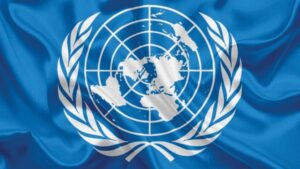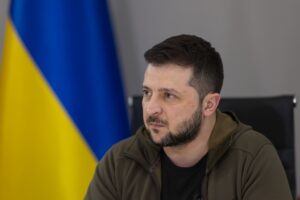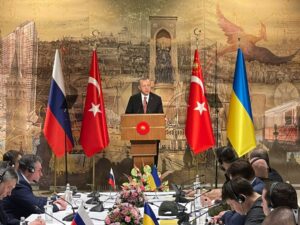
Violation of the territorial integrity of Ukraine is inconsistent with the UN Charter, said UN Secretary General Antonic Guterres.
“We firmly believe that the violation of the territorial integrity of any country is completely inconsistent with the UN Charter. We are deeply concerned about what is happening now. We believe that there has been an invasion of the territory of Ukraine,” Guterres said during negotiations with Russian President Vladimir Putin on Tuesday in Moscow.
The claims that Russia has regarding Ukrainian issues and European global security must be resolved, guided by the UN Charter, Guterres said.

The American postal service UPS has suspended its work in Ukraine.
As reported on its website, the decision was made “because of the situation in Ukraine.” Operations have also been halted in Belarus and Russia.
UPS provides mail service in 220 countries around the world.

President of Ukraine Volodymyr Zelensky said he wants the end of the war with Russia and spoke in favor of a diplomatic way to end it.
“I want to stop the war and end it. There is a diplomatic path, there is a military one. Any healthy person always chooses the diplomatic path, because he knows: even if it is difficult, it can stop the loss of thousands, tens of thousands, and with such neighbors hundreds of thousands, and maybe even millions of victims. I don’t want this. And any leader, whether he personally wants it or not, has no right to subjectively cancel the diplomatic path,” Zelensky said at a press conference in Kyiv on Saturday.

Turkish President Recep Tayyip Erdoğan on Friday reiterated that Ankara is ready to organize a meeting of the heads of Russia and Ukraine, Anadolu said.
“Turkey is making efforts to continue the Istanbul process between Russia and Ukraine, and is ready to organize a dialogue at the level of heads of state,” the agency said.
Erdoğan also expressed hope for progress in the Ukrainian-Russian negotiations.
“There is progress. However, they are far from desired. We hope for progress. We do not lose hope,” Anadolu said, citing the Turkish leader.

German Foreign Minister Annalena Burbock said that Germany will gradually stop buying Russian energy resources, in particular, by the end of the year it will completely stop importing Russian oil.
“Security in Europe means that we reduce and stop our dependence on Russia, primarily in energy policy. We want to stop importing Russian gas, better today than tomorrow,” Burbock said on Wednesday, she is on a trip to Latvia and the press conference was broadcast by the German TV channel Welt.
According to the minister, Germany “made mistakes” in the past, so now it is necessary to stop importing energy carriers from Russia.
“From coal imports to the end of summer, we will halve oil imports by summer and bring them to zero by the end of the year,” Burbock said.

The EXMO cryptocurrency exchange has sold part of its digital assets business in Russia, Belarus and Kazakhstan, the exchange said on Tuesday.
According to the exchange, EXMO announced the transfer of part of the business to Russian owners and the termination of work with the markets of Russia, Belarus and Kazakhstan, after Russia invaded the territory of Ukraine and started a full-scale war.
The company said that this was done in order to continue to fulfill obligations to customers and stakeholders, as well as to ensure a high level of protection and security.
“It’s been a tough decision for us, since we have spent over eight years building a strong community of crypto enthusiasts throughout the world, adhering to the highest compliance practices and delivering outstanding services to all our clients wherever they lived. However, following Russia’s invasion of Ukraine, EXMO.com as a global group wishes to avoid risking our global expansion plans by operating in such high risk markets,” CEO of the crypto exchange Serhiy Zhdanov said, commenting on the situation.
Kazakhstan clients were also included as a part of the deal, since a new team is based in Kazakhstan. The new owner of the Russian, Belarusian and Kazakh digital assets exchange business is the owner of a Russian based software development company, which was one of the vendors to provide engineering services to EXMO during the last three years.
EXMO.com user agreement was recently amended to state that Russian, Belarusian and Kazakh residents are no longer being onboarded. Russian Rubles pairs were disabled since April 15, 2022 on EXMO.com.
Earlier, the EXMO cryptocurrency exchange created the Save Ukraine Relief Fund to raise funds to help Ukrainian citizens affected by the war.
EXMO’s own contribution amounted to $1 million and has so far collected $594,000 through crypto contributions from exchange users.
EXMO is an international cryptocurrency exchange founded in 2014. The platform provides cryptocurrency trading and storage opportunities for more than 2 million traders from all over the world.
BUSINESS, CRYPTOCURRENCY EXCHANGE, DIGITAL ASSETS, EXMO, RUSSIA